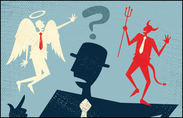Research
My research draws on judgment and decision-making, social psychology, and organizational behavior to study two prominent concerns in workers’ personal and organizational lives: creativity and ethics. Workers want to flourish in their jobs and they want to be good people. I seek to understand how people navigate the creative and ethical challenges in their lives to achieve these goals.
Creativity & Performance
In this line of research I study beliefs about creativity. This work is guided by two general questions: What do people believe to be true about creativity? And how do those beliefs stack up against the reality of the creative process? For instance, work with Loran Nordgren finds that people tend to undervalue persistence in the creative process and, as a consequence, they underestimate their own ability to generate ideas (Lucas & Nordgren, 2015). Other work with Drew Carton finds that people overlook the power of experiential thinking when creating visions of the future, and that an intervention that prompts people to project themselves into the future and think experientially (e.g., imagining sights, sounds, smells) can increase the quality of their vision statements (Carton & Lucas, 2018).
In this line of research I study beliefs about creativity. This work is guided by two general questions: What do people believe to be true about creativity? And how do those beliefs stack up against the reality of the creative process? For instance, work with Loran Nordgren finds that people tend to undervalue persistence in the creative process and, as a consequence, they underestimate their own ability to generate ideas (Lucas & Nordgren, 2015). Other work with Drew Carton finds that people overlook the power of experiential thinking when creating visions of the future, and that an intervention that prompts people to project themselves into the future and think experientially (e.g., imagining sights, sounds, smells) can increase the quality of their vision statements (Carton & Lucas, 2018).
Morality & Ethical Behavior
What influences people's willingness to help and to harm one another? In this line of research I study how basic (non-moral) social cognitive processes (e.g., ideological beliefs, perspective-taking, affect regulation) influence outcomes central to morality and ethics (e.g., moral judgments, empathy, unethical behavior). For instance, work with Nour Kteily finds that the link between anti-egalitarianism and empathy depends on the status of the target, such that anti-egalitarianism reduces empathy toward disadvantaged targets but egalitarianism reduces empathy toward advantaged targets (Lucas & Kteily, 2018). As another example, work with Adam Galinsky and Keith Murnighan finds that perspective-taking (while typically beneficial for the target) with a moral transgressor increases condemnation and dislike when the perceiver assumes the target to have malicious intentions (Lucas, Galinsky, & Murnighan, 2016).
What influences people's willingness to help and to harm one another? In this line of research I study how basic (non-moral) social cognitive processes (e.g., ideological beliefs, perspective-taking, affect regulation) influence outcomes central to morality and ethics (e.g., moral judgments, empathy, unethical behavior). For instance, work with Nour Kteily finds that the link between anti-egalitarianism and empathy depends on the status of the target, such that anti-egalitarianism reduces empathy toward disadvantaged targets but egalitarianism reduces empathy toward advantaged targets (Lucas & Kteily, 2018). As another example, work with Adam Galinsky and Keith Murnighan finds that perspective-taking (while typically beneficial for the target) with a moral transgressor increases condemnation and dislike when the perceiver assumes the target to have malicious intentions (Lucas, Galinsky, & Murnighan, 2016).


